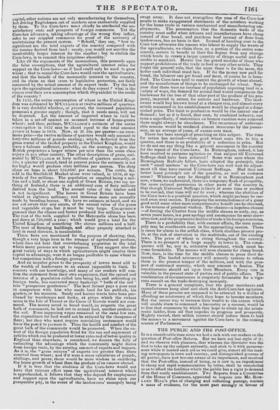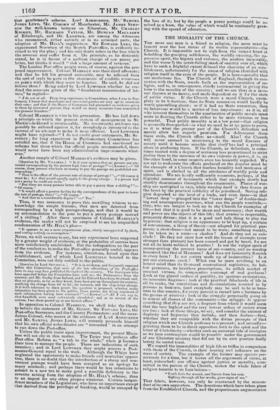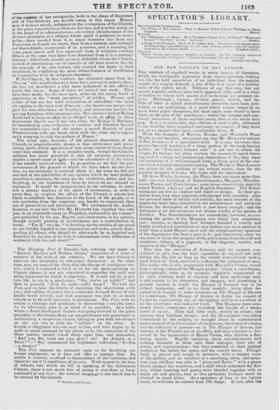THE PUBLIC AND THE POST-OFFICE.
IT is a considerable time since we had a talk with our readers on the question of Post-otlice Reform. But we have not lost sight of it; an:1 we observe with pleasure, that whereas the Spectator was the first to take up the subject earnestly, and stick to it with perseverance while it needed such aid as we could give, almost all the leading newspapers in town and country, and distinguished persons of all parties, have now became aware of its importance, and resolved that the Post-office, instead of being, as it now is, an impediment to cheap and rapid communication by letter, shall be remodelled so as to afford the facilities which the public has a right to demand from that costly establishment. Two Reports from a Committee of the House of Commons, appointed to inquire into Mr. Row. LAND HILL'S plan of charging and collecting postage, contain a mass of evidence, for the most part strongly in favour of that gentleman's scheme. Lord ASHBURTON, Mr.' SAMUEL JONES LOYD, Mr. Connate of Manchester. Mr. JAMES Sitar SON the well-known lecturer on Education, Mr. CHARLES KNIGHT, Mr. RICHARD TAYLOR, Mr. DUNCAN MACLAREN of Edinburgh, and Dr. LARDNER, are among the witnesses who recommend, either entirely or in its principal parts, the adoption of Mr. Hite's suggestions. Sir EDWARD LEES, the experienced Secretary of the Scotch Post-office, is evidently inclined to try the plan ; and his only doubt refers to the loss which the revenue may suffer from it. On principle, as he distinctly stated, he is in favour of a uniform charge of one penny per letter, but thinks it would " risk a large amount of revenue." The London Post-office people were, of course, against the proposed improvement. Colonel NI AHERLY was their chief advocate; and that he felt his ground untenable, may be inferred from the sort of reply he gave to the statements of credible witnesses on points with which they must be familiar. He said, he did not believe them ! Being asked by Lord LOWTHER whether he credited the acconnts given of the " fraudulent transmission of letters," he replied ,' I do not at all. From long experience in Committees, when I was in Parliament, I know that merchants and interested parties are very apt to overst ite their ease; and that if the /louse of Commons had proceeded on evidence given to them by interested parties, they would on many occasions have committed the grossest blunders."
Colonel MAHERLY is wise in his generation. He has laid down a principle on which the present system of management in St. Martin's-le-Grand is invulnerable. No trustworthy evi lence can possibly be adduced against it, for everybody is interes'ed in the success of an attempt to make it mere efficient. Lord LOWTHER might have rejoined—" I do not credit your statements, Mr. Se. cretary ; for long experience in Parliamentary Committees has satisfied me, that if the House of Commons had sanctioned no reforms but those which the official people recommended, there would never have been any administrative improvements whatever:* Another sample of Colonel MABERLY'S evidence may be given.
[Question by Mr. VitAtztts.) " Is it your opinion that no persons are prevented corresponding by the present high rates of postage?"—[enswert—,, Of course, those persons who have no money to pay the postage are prohibited corresponding." "That is the effect of the present rate of charge of postage ?"—" Of course it must be; but that would equally apply to the penny charge : if a person had not a penny he could not write."
"But there are many persons better able to pay a penny than a shilling?" "Of course."
"It would afford a greater facility for the correspondence of the poor to lower the rate of postage, then ?"—" Of course."
"And that to a considerable degree ? "—" Yes."
Thus, it was necessary to press this unwilling witness to acknowledge the simple truisms, that men are deterred from corresponding by a high postage-charge, and that it would be an accommodation to the poor to pay a penny postage instead of a shilling ! After these specimens of Colonel Mstmemt's evidence, the reader will not be surprised to see his unqualified condemnation of Mr. Hues plan
" It appears to me a most preposterous plan, utterly unsupported by facts, and resting entirely on assumption."
Never, we will venture to say, has any experiment been supported by a greater weight of evidence, or the probability of success been more satisfactorily established. But the indisposition on the part of the conductors to make the Post-office generally useful, appears from the evidence. For instance, alterations, forced upon that establishment, and of' which Lord LICHFIELD boasted to the Committee, were not duly notified to the public.
[Question by Lord SEYMOUR.) "It is in evidence, and frequently repeated before this Committee, that none of the late alterations of Me Post-office hare in any way been published throughout the country. The Surveyors who have appeared before the Committee have said so ; the Postmasters from the country, and Mr. Godby from Ireland, and Sir Edward Lees from Scotland, said, that no placards, so far as they know, have been put up throughout the country, notify ing the change from 4d. to 2d., for instance, and the ship-letter charge. It is with reference to these points the question is proposed, whether really intonation has been given to the public, those parties not being cognizant of such information having been conveyed ?"—[Answer; —"All I can say is, that handbills were most extensicel,y circubded ; and as to several of the notices, I see them posted up at our branch offices."
In opposition to Colonel MABERLY, we shall take the liberty to believe the statement of Mr. GODRY, Sir EDWARD LEES, the Post-office Surveyors, and the Country Postmasters: and the incredulous Colonel, who sneers at the evidence of Lord ASHBURTON and Mr. SAMUEL JONES LOYD, will scarcely persuade himself that his own official suboldinates are " interested 'S in an attempt to run down the Post-office.
Unless the public insist upon improvement, the present Ministers will not stir in this matter. The Tories may perhaps offer Post.office Reform as "a tub to the whale," when jt becomes their turn to manage the people. There are indications of such Intention ; and in Lord LOWTHER they might possess a Postmaster-General equal to the work. Although the Whigs have neglected the opportunity to make friends and neutralize opposition, there is no doubt that the introduction of a cheap and convenient postage would have been accepted as an apology for many misdeeds; and perhaps there would be less reluctance to submit to a new tax to make good a possible deficiency in the revenue arising from the adoption of Mr. Hue's scheme, than to an impost for any other purpose whatever. Certain insignificant members of the Legislature, who have no importance except tt hat dereved from the privilege of franking. would be annoyed by the loss of it; but by the people a penny postage would be received as a boon, the value of which would be continually growing with the spread of education.
THE MORALITY OF THE CHURCH.
THE more any man is a friend to religion, the more must he lament over the lost virtue of its visible representative—the Church. It is impossible not to sigh from the inmost heart at beholding the grasping selfishness, the worldly cunning, the oppressive spirit, the bigotry and violence, the positive immorality, and (far worse!) the never-failing mask of sanctity over all, which have to such a frightful extent debased the character of an esteblishtnent, unfortunately for the cause of religion identified with religion itself in the eyes of the people. It is here especially that our misfortune lies. The Church of England, through its connexion with the State, stands forth as the representative of religion, and is, in consequence, chiefly instrumental in giving the tone to the morality of the country ; and we are thus in a man ner thrown at its mercy, and made dependent on it for the state of public virtue. It the Church were a moral Church, exemplary in its lehaviour, then its State connexion would hardly be worth quarrelling about ; or if it had no State connexion, then its behaviour would be a matter of less importance : as it is, all who interest themselves in the amelioration of public morals must unite in desiring the Church either to be more virtuous or less powerful. That public morality is at a low point—that religion is generally disregarded—is what we need be at no pains to prove, as it is what the greater part of the Church's defenders not merely allow but eagerly proclaim. For deliverance from these evils, the Church offers us—itself. Alas! the Church will never succeed in ministering to the moral diseases of society until it become sensible that itself has had a principal share in producing them. If the Church, as defendant, is sometimes treated with a degree of acrimony less proportioned to strict justice than to the measure of its own violence in power, it is, on the other hand, in some respects even too leniently regarded. We are apt to underrate the effects produced on the popular mind by the example of a Church that teaches humility and meekness of spirit, and is clothed in all the attributes of worldly pride and splendour. We are hardly sufficiently conscious, perhaps, of the frightful amount of insincerity which that example slowly but steadily disseminates throughout the community. Places of worship are multiplied in vain, while worship itself is thus frozen at the heart by the practical infidelity of its priesthood. Seeing religion degraded to the level of a trade, and even there—in that "lowest deep "—plunged into the "lower deeps" of double-dealing and unscrupulous practices, what can the people conclude,— they, who are taught to look up to the Church for examples of life,—but that it is good to be mean and mercenary; that wealth and power are the objects of this life; that avarice is respectable, prosperity divine; that it is a good and holy thing to play the hypocrite; that religion is an appearance to be kept up, a curtain of convenience, a thing of theory—not adapted for practical purposes; a show-dress—not meant to be worn; something weekly, to be taken in; a name—a shadow And do they not so conclude? Do they not show how well the lesson of example (ever stronger than precept) has been conned and got by heart, far are not all its hints reduced to practice ? Is not the vulgar spirit of money-getting the present curse of our country, and no worship honoured like that of Mamnaon ? And does not insincerity flourish in every form ? Is not society made up of insincerities ? Is it not one elaborate mask ? What can be more revolting to an honest mind than its thousand conventional sophistries, its hollow pretences, its heartless proscriptions, its selfish market of nominal virtues, its comparative contempt of real goodness? Look at the glazed surface of gentility, its specious assumptions, its miserable disguises : look at the practical falsehoods of life in all its ranks, the simulations and dissimulatians resorted to by persons in business, (and everybody may be said to be in business in this country, for every pursuit is turned into a businesa by the genius of avarice): look at the struggle perpetually going on in almost all classes of the community—the struggle to appear something that they are not, a disgrace from which it would seem that the very highest and the very lowest orders of society alone are free : look at these things, we say, and consider the amount of duplicity and hypocrisy they include, and then declare—first, whether they are compatible with the divine precepts of that religion which our Church professes to represent; and secondly— granting them to be in direct opposition both to the spirit and the letter of Christianity—whether such an universal tide of irreligion as we here contemplate would be possible under the government of any Christian ministry that did not by its own practice foully betray its sacred trust.
We regard the immoralities of high life as trifles in comparison
with those of the Church, in their bearing and influence on the mass of society. The example of the former may operate perniciously for a time, but it leaves all the arguments of virtue, at least, untouched: one offence against justice or morality, committed in the person of the Church, makes the whole fabric of religion tremble to its foun.lations-
Estrth feels the wound, and Nature from her seat, Sighing through all her woiks, gives signs of wo."
That fabric, however, can only be overturned by the misconduct of its own supporters. The desertions which have taken place from the Established Church, and the proportionate augmentation
of do-number of her antagonists, both in the shape of dissenters and of free-thinkers, are mainly owing to this cause. Honest men of zealous minds, indignant at the corruptions of the Church, at the gross contradictions between doctrine and practice going on in the heart of its administration—its virtual abandonment of the divinest principles of a religion whose spirit it professes to monopolize,--have seceded from it, in many instances less from any disposition to dispute its tenets, than froma natural, and certainly not discreditable, resentment of its practices, and ayeartung for some purer source and less equivocal form of religious worship. Others at the same time have been detached from it in a contrary manner ; individuals already prone to disbelief, whom the Church, instead of conciliating—as its apostles of old were wont to do—by the example of its own virtues, only rivetted the faster to their scepticism, by exhibiting the most odious features of worldliness in conjunction with the religious character. If the Church, by her conduct, has alienated many from her "bosom" who would othei wise have been content to remain there, she has not manifested a whit more judgment in her efforts to repair her losses. Some of these we noticed last week. They have been made, for the most part, either by the strong hand of oppression or the " weak inventions" of artifice. Prisons and courts of law are her mild restoratives of orthodoxy—the balm she applies to the hurt soul of heresy ; she throws one person into gaol for non-attendance on Sundays, and prosecutes another for quoting Scripture without permission. She excites a mob at Bishop Auckland to burn in effigy (it is obliged to be in ejlgy in these degenerate days I) one of her own cloth, the Bishop of Durham. for manifesting some evidences of candour and liberality beyond her comprehension ; and she makes a grand flourish of pure Protestantism with one hand, while with the other she is ingeniously essaying to pick the pockets of Popery ! The worst sign, however, of the present disposition of the Church, is unquestionably shown in that intolerance and persecuting spirit, which opposition of late seems rather to have sharpened than subdued. It is a singular truth, though the Churchmilitant has never perceived it, that all religious persecution implies a secret want of fgith—not the abundance of it, for which it has usually receised credit. In proportion as we feel the precariousness of the ground on which we have taken up our position, we are animated to contend about it ; the more we feel not satisfied of the infallibility of any opinion which we have pledged ourselves to maintain, the more are we vindictive, bitter, and unforgiving, in our treatment of those by whom we are crossed in argument. It would be inappropriate, in our columns, to enter into a minute analysis of the spirit of intolerance, in order to prove that, as respects the affairs of the Church, a course less likely to establish her doctrines in the heart of the people, or to win conviction from the sceptical, can hardly be conceived, than one of persecution and intolerance. We recommend the reader, however, to see how the late Mr. HAZLITT has handled this subject, in an admirable essay on Prejudice, contained in the volume* just published by his son. Bigotry and intolerance, in his opinion, though usually passing as synonymous, are a contradiction in terms. "For if," says he, "in drawing up the articles of our creed we are blindly bigoted to our impressions and views, utterly disregarding all others, why should we afterwards be so haunted and disturbed by the last, as to wish to exterminate every difference of sentiment with fire and sword?"




























 Previous page
Previous page